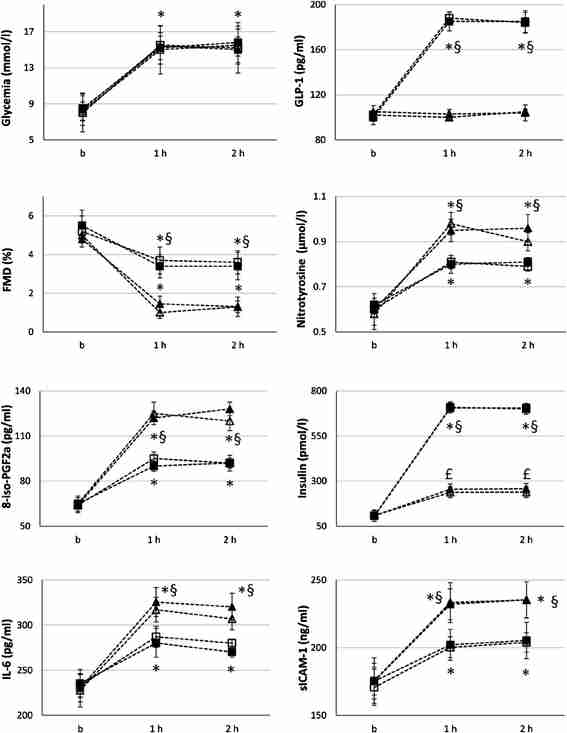The protective effect of the Mediterranean diet on endothelial resistance to GLP-1 in type 2 diabetes: a preliminary report
- PMID: 25407792
- PMCID: PMC4240857
- DOI: 10.1186/s12933-014-0140-9
The protective effect of the Mediterranean diet on endothelial resistance to GLP-1 in type 2 diabetes: a preliminary report
Abstract
Background: In type 2 diabetes, acute hyperglycemia worsens endothelial function and inflammation,while resistance to GLP-1 action occurs. All these phenomena seem to be related to the generation of oxidative stress. A Mediterranean diet, supplemented with olive oil, increases plasma antioxidant capacity, suggesting that its implementation can have a favorable effect on the aforementioned phenomena. In the present study, we test the hypothesis that a Mediterranean diet using olive oil can counteract the effects of acute hyperglycemia and can improve the resistance of the endothelium to GLP-1 action.
Methods: Two groups of type 2 diabetic patients, each consisting of twelve subjects, participated in a randomized trial for three months, following a Mediterranean diet using olive oil or a control low-fat diet. Plasma antioxidant capacity, endothelial function, nitrotyrosine, 8-iso-PGF2a, IL-6 and ICAM-1 levels were evaluated at baseline and at the end of the study. The effect of GLP-1 during a hyperglycemic clamp, was also studied at baseline and at the end of the study.
Results: Compared to the control diet, the Mediterranean diet increased plasma antioxidant capacity and improved basal endothelial function, nitrotyrosine, 8-iso-PGF2a, IL-6 and ICAM-1 levels. The Mediterranean diet also reduced the negative effects of acute hyperglycemia, induced by a hyperglycemic clamp, on endothelial function, nitrotyrosine, 8-iso-PGF2a, IL-6 and ICAM-1 levels. Furthermore, the Mediterranean diet improved the protective action of GLP-1 on endothelial function, nitrotyrosine, 8-iso-PGF2a, IL-6 and ICAM-1 levels, also increasing GLP-1-induced insulin secretion.
Conclusions: These data suggest that the Mediterranean diet, using olive oil, prevents the acute hyperglycemia effect on endothelial function, inflammation and oxidative stress, and improves the action of GLP-1, which may have a favorable effect on the management of type 2 diabetes, particularly for the prevention of cardiovascular disease.
Figures

Similar articles
-
The possible protective role of glucagon-like peptide 1 on endothelium during the meal and evidence for an "endothelial resistance" to glucagon-like peptide 1 in diabetes.Diabetes Care. 2011 Mar;34(3):697-702. doi: 10.2337/dc10-1949. Epub 2011 Jan 27. Diabetes Care. 2011. PMID: 21273492 Free PMC article. Clinical Trial.
-
Vitamin C further improves the protective effect of glucagon-like peptide-1 on acute hypoglycemia-induced oxidative stress, inflammation, and endothelial dysfunction in type 1 diabetes.Diabetes Care. 2013 Dec;36(12):4104-8. doi: 10.2337/dc13-0750. Epub 2013 Oct 15. Diabetes Care. 2013. PMID: 24130351 Free PMC article. Clinical Trial.
-
Glucagon-like peptide 1 reduces endothelial dysfunction, inflammation, and oxidative stress induced by both hyperglycemia and hypoglycemia in type 1 diabetes.Diabetes Care. 2013 Aug;36(8):2346-50. doi: 10.2337/dc12-2469. Epub 2013 Apr 5. Diabetes Care. 2013. PMID: 23564922 Free PMC article. Clinical Trial.
-
International conference on the healthy effect of virgin olive oil.Eur J Clin Invest. 2005 Jul;35(7):421-4. doi: 10.1111/j.1365-2362.2005.01516.x. Eur J Clin Invest. 2005. PMID: 16008542 Review.
-
Harnessing the incretin system beyond glucose control: potential cardiovascular benefits of GLP-1 receptor agonists in type 2 diabetes.Diabetes Metab. 2012 Oct;38(4):298-308. doi: 10.1016/j.diabet.2012.04.003. Epub 2012 Jun 4. Diabetes Metab. 2012. PMID: 22672960 Review.
Cited by 18 articles
-
Analysis of the intricate effects of polyunsaturated fatty acids and polyphenols on inflammatory pathways in health and disease.Food Chem Toxicol. 2020 Jul 5;143:111558. doi: 10.1016/j.fct.2020.111558. Online ahead of print. Food Chem Toxicol. 2020. PMID: 32640331 Free PMC article. Review.
-
Type 2 Diabetes Mellitus in Class II and III Obesity: Prevalence, Associated Factors, and Correlation between Glycemic Parameters and Body Mass Index.Int J Environ Res Public Health. 2020 Jun 2;17(11):3930. doi: 10.3390/ijerph17113930. Int J Environ Res Public Health. 2020. PMID: 32498226 Free PMC article.
-
Effects of Olive Oil on Blood Pressure: Epidemiological, Clinical, and Mechanistic Evidence.Nutrients. 2020 May 26;12(6):1548. doi: 10.3390/nu12061548. Nutrients. 2020. PMID: 32466599 Free PMC article. Review.
-
Cardioprotective Effect of Olive Oil Against Ischemia Reperfusion-induced Cardiac Arrhythmia in Isolated Diabetic Rat Heart.Cureus. 2020 Feb 24;12(2):e7095. doi: 10.7759/cureus.7095. Cureus. 2020. PMID: 32231891 Free PMC article.
-
Relationship Between Oxidative Stress, ER Stress, and Inflammation in Type 2 Diabetes: The Battle Continues.J Clin Med. 2019 Sep 4;8(9):1385. doi: 10.3390/jcm8091385. J Clin Med. 2019. PMID: 31487953 Free PMC article. Review.
References
-
- Estruch R, Ros E, Salas-Salvadó J, Covas MI, Corella D, Arós F, Gómez-Gracia E, Ruiz-Gutiérrez V, Fiol M, Lapetra J, Lamuela-Raventos RM, Serra-Majem L, Pintó X, Basora J, Muñoz MA, Sorlí JV, Martínez JA, Martínez-González MA, PREDIMED Study Investigators Primary prevention of cardiovascular disease with a Mediterranean diet. N Engl J Med. 2013;368:1279–1290. doi: 10.1056/NEJMoa1200303. - DOI - PubMed
-
- Zamora-Ros R, Serafini M, Estruch R, Lamuela-Raventós RM, Martínez-González MA, Salas-Salvadó J, Fiol M, Lapetra J, Arós F, Covas MI, Andres-Lacueva C, PREDIMED Study Investigators Mediterranean diet and non enzymatic antioxidant capacity in the PREDIMED study: evidence for a mechanism of antioxidant tuning. Nutr Metab Cardiovasc Dis. 2013;23:1167–1174. doi: 10.1016/j.numecd.2012.12.008. - DOI - PubMed
Publication types
MeSH terms
Substances
LinkOut - more resources
-
Full Text Sources
-
Medical
-
Research Materials
